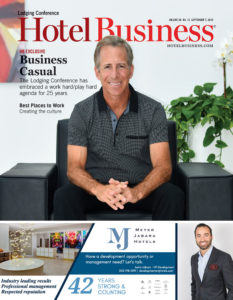Beekeeper went on a journey to uncover leading factors that contribute to workplace culture in the hospitality industry. The following is the report, sponsored by Beekeeper and submitted to Hotel Business.
The survey received 1,166 respondents who shared their perspectives on what hotels can do to create a strong company culture. This study analyzes trends in enabling a positive culture, as well as negative detractors to reveal possible patterns that could be contributing to the high turnover rates hotels are currently battling.
Methodology
Beekeeper partnered with EffectUX which created the survey and analyzed the results. Hotel Business handled survey distribution, including placement on its website, a video and direct communications to its database.
The survey included 49 questions regarding various aspects of culture, how likely the employees were to recommend their company as a place to work, and open questions about what employees liked and what they would improve about their workplace.
The questions covered 14 categories: communications; growth; flexibility; incentives; individual capabilities; technologies; leadership; management; measure and insights; process and structure; productivity; purpose; trust development; and workspaces.
Outstanding company culture
Culture is the unseen set of values and behaviors of a company that defines the workplace experience. Companies with strong internal cultures tend to have higher levels of employee engagement, lower turnover rates and higher guest satisfaction scores.
Based on the survey responses, PM Hotel Group performed highest in the most categories identified as indicators of a strong culture. Honorable mentions for culture were Concord Hospitality Enterprises and Caesars Entertainment Corporation, both of which scored highly.
Let’s take a look at what empowers their strong cultures.
PM Hotel Group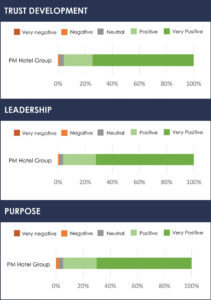 Here is where PM Hotel Group excelled and some of the contributing factors that respondents felt made the company’s culture so great.
Here is where PM Hotel Group excelled and some of the contributing factors that respondents felt made the company’s culture so great.
Trust development
Trust development included questions about treating all people with respect, camaraderie, diversity of thought, commitment to the future and pride. Participants cited these supporting points around trust development: They enjoyed the teams they work with and feel that their colleagues are supportive, available, open and helpful.
Leadership
Leadership included questions about leadership demonstrating integrity, leadership inspiring employees and confidence in leadership. Participants cited these supporting points around leadership: listening to employees and being available and accessible to staff.
Purpose
Purpose included questions about the employee’s ability to feel comfortable to be themselves, feeling valued, feeling the company values are demonstrated, and seeing how they, as employees, contribute to the bigger picture. Participants cited these supporting points around purpose: celebrating employee success and contributions; the ability to bring value; and empowering associates to think creatively.
Concord Hospitality Enterprises
Respondents cited the workplace environment, sense of community and fun, energizing and family atmosphere as reasons why this company has a strong culture.
“This company truly stands behind their associates and really empowers them! Every associate believes in the culture and who we are as a company and you can tell.”
—Concord Hospitality respondent
Below are some of the words respondents used to describe the culture.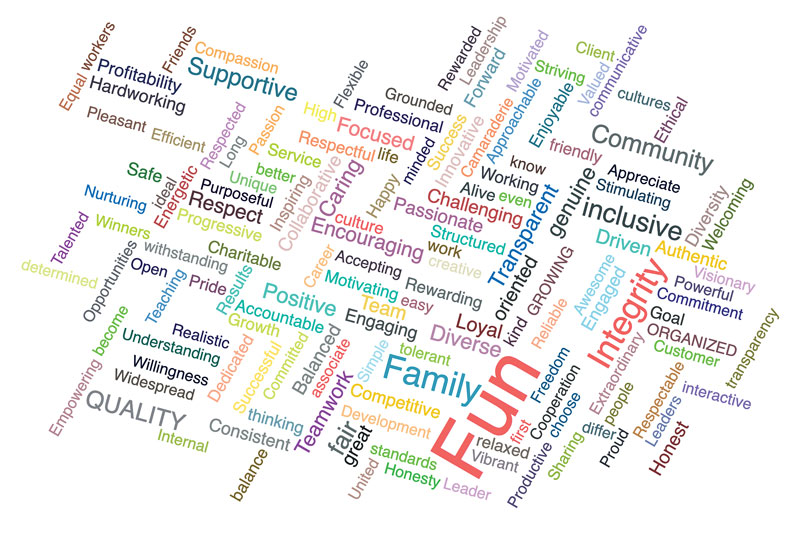
Caesars Entertainment Corporation
Respondents cited the caring atmosphere, support for inclusivity and diversity of thought, and communications as reasons why Caesars Entertainment has a strong culture.
“[What I love most about my organization is the] diverse and welcoming company culture.”
—Caesars Entertainment respondent
Below are some of the words respondents used to describe the culture.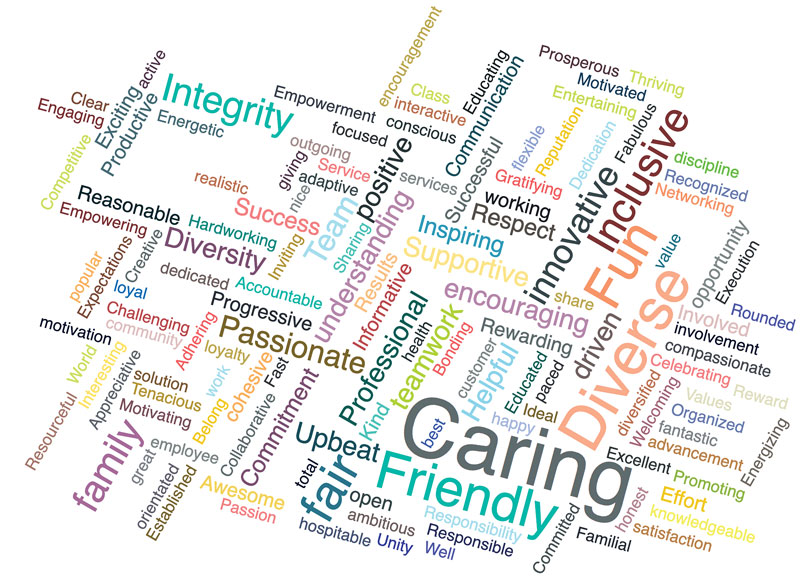
Trends
The hospitality industry relies on personalized human interaction to deliver an exceptional guest experience. Because of this, it comes as no surprise that genuine human connection was a recurring theme throughout the survey.
The survey finds that people (both management and peers) can make or break an employee’s experience—just like they can make or break a guest experience. First, let’s examine hospitality culture trends in the demographic breakdown of survey participants.
Survey demographics
Age
Younger generations scored culture lower than older generations. Age also correlates with seniority, and employees with higher seniority reported more positive sentiments. There have been findings to indicate these younger generations have higher expectations of their employers and are less willing to endure difficult work environments than their more seasoned coworkers.
Tenure
Participants with a tenure of three-to-five years tended to score their company slightly lower. This time frame is consistent with the amount of time it takes for the “honeymoon” period to wear off, and becomes a critical time when employees may start looking for work elsewhere.
Position
Participants in lower levels of management or individual contributor roles scored lower than those in a position of leadership within the company. This indicates a gap in perception between what leadership members experience and believe, and what frontline employees actually experience. This could indicate a disconnect between leadership and frontline employees in the hospitality industry.
Trends in positive culture enablers
Participants indicated the following factors contributed to a positive culture experience for hospitality employees.
Colleagues
Respondents indicated that one of the strongest factors that contributes to a positive company culture is the relationships they have with their co-workers. The survey showed when people are friendly and care about each other, employees tend to experience a “family feel” at their direct team and organizational level.
“There is a great family atmosphere here and I enjoy the team aspect. Everyone is always
working toward the same end goal.”
—Survey respondent
Leadership
Strong leadership who leads by example and treats their employees with respect was also shown to be a factor in building a positive culture. Leadership who makes themselves accessible to their team and makes their employees feel valued and understood is an important element of company culture.
“I love the accessibility to our senior leaders. They are approachable and encourage feedback and provide timely responses to concerns.”
—Survey respondent
Management
Having a management team that encourages and shows appreciation for their employees and empowers them to do their jobs well also plays an important role in positive culture enablers.
Perks
Employee perks were also shown to be a factor in creating a positive culture for hospitality employees. These company perks include:
• professional development opportunities
• benefits
• flexible work environment
• recognition for their contributions and hard work
It’s interesting to note the holistic view of employee perks indicated in this list. Instead of limiting the definition of a perk to rewards, respondents included items such as professional development and flexibility as a workplace perk that positively impacts their view of company culture.
Trends in culture detractors
Participants indicated the following factors detracted from their culture experience within their hospitality company.
Colleagues at all levels of the organization
While colleagues were a leading factor in building a positive culture, “people” were also shown to be a factor in contributing to a negative culture experience for hospitality employees. This is particularly true when employees experience unfair treatment or question the ethics of management or leadership.
Additionally, if employees feel they are not supported or that they are micro-managed, coupled with a lack of accountability, this contributes to a negative culture.
Events
A lack of team events to increase morale and team bonding was shown to be a detractor in culture trends.
Communications
A lack of internal communication and transparency negatively impacted participants’ perceptions of their company culture. This causes employees to feel there is no longer a personal touch.
Pay and growth
Participants indicated when pay is not on par with best practices, it negatively affects the overall culture. Below-average pay, combined with limited career growth and a lack of access to opportunities or professional advancement, were shown to be culture detractors.
Conclusion
What can hoteliers learn from the trends shown in this hospitality culture report? Here are some key takeaways.
Frontline employees are more vulnerable to culture detractors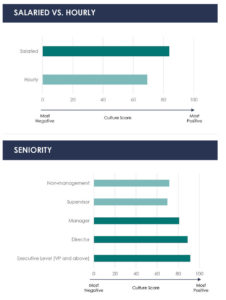
Given that younger, hourly employees with less seniority tended to score lower and were less likely to recommend their workplace than their more senior-level counterparts, it follows that hospitality organizations could be doing more to make their frontline workers feel included in the company culture.
Unfair treatment, below-average pay, lack of communication, and limited access to growth opportunities were major cultural detractors for survey participants. Hospitality companies can combat this negative perception by improving pay for hourly workers, providing training and opportunities to advance within the company, and improving internal communication efforts between corporate and frontline workers.
Communication is key
Communication was, by far, the number one element of company culture that respondents said they would improve. The results of the study suggest that hospitality organizations with strong alignment between management and frontline teams with a transparent, well-communicated decision-making process tend to have employees who are more likely to recommend the company to others, and have positive sentiments toward the brand.
Additionally, work environments that were described by employees as highly collaborative, fun, and supportive, where people help each other and freely share information, scored higher in cultural excellence. This reinforces the “family-like dynamic” that participants indicated as a positive culture enabler.
Bringing frontline hospitality employees into the fold through transparent communication, teamwork and opportunities for growth can help hotels build a stronger brand, deliver a superior guest experience and, ultimately, retain and attract top talent. HB

